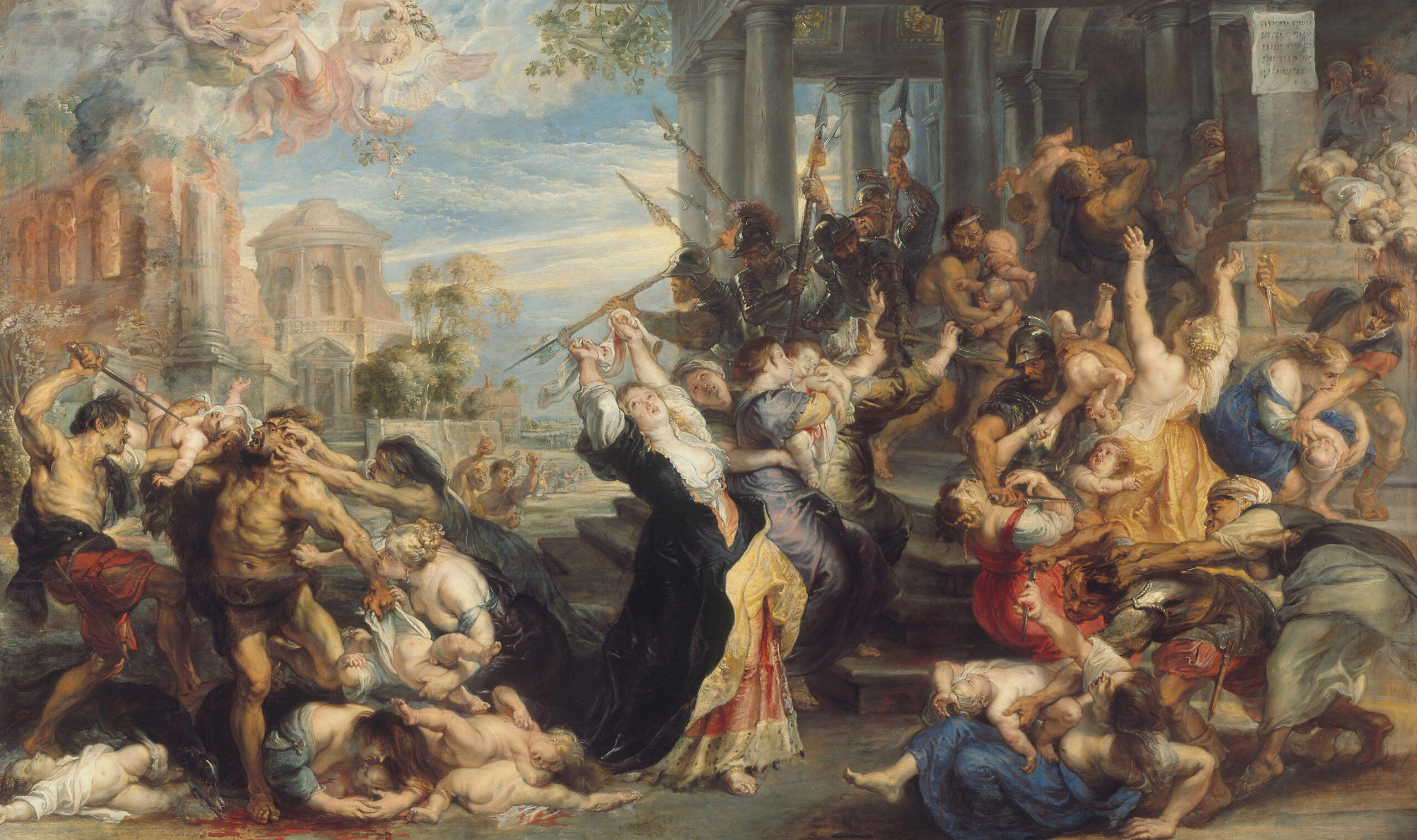Motherhood After Christianity
What happens to society’s most vulnerable after the Christian ethos is gone?

Mothers, Children, and the Body Politic: Ancient Christianity and the Recovery of Human Dignity, by Nadya Williams, InterVarsity Press
Does history bend toward progress or does it bend toward chaos? In her new book Mothers, Children, and the Body Politic: Ancient Christianity and the Recovery of Human Dignity, the classics scholar Nadya Williams argues that any society without a guiding Christian ethos is doomed to death and destruction.
Life in ancient pre-Christian societies was “nasty, brutish, and short,” to borrow Hobbes’s phrase. This was especially true for widows, orphans, the disabled, and the elderly. When Christianity spread around the Mediterranean coast, so did the conviction that women, children, and other “useless ones,” as Williams calls them, deserved to be treated with dignity and care.
Most Western societies can no longer be characterized as Christian, something lamented by even the outspoken atheist Richard Dawkins, who now describes himself as a “cultural Christian.” Dawkins, who recently warned against celebrating the decline of Christianity in the United Kingdom, would probably find some points to agree with in Williams’s book. Using military history, classic literature, and accounts of the early church, she draws parallels between the treatment of useless ones in ancient Greece and Rome and the rise of abortion, euthanasia, and eugenics in the post-Christian West.
“History…has come full circle in a rather depressing way, showing how the modern culture of devaluing life too often bears mournful resemblance to the ancient one, despite the culture of life that early Christianity proposed,” Williams writes. “Thankfully, there is more to the story, and it involves all of us directly.”
Williams calls for Christians to be pro-life not only with their words but with their actions. Being pro-life could be as simple as volunteering in a church nursery, she says. Williams focuses much of the book on showing what happens when a society embraces a culture of death. Infanticide, bloodsport, and mass rape were unquestioned aspects of ancient life. Such horrors are totally foreign to modern man—or are they? Humans are enjoying longer and healthier lives than ever before, but utilitarian Western culture is far from pro-life. Williams argues that for all our technological advancements, we still fail to see others for who they truly are: image-bearers of the one true God.
Readers don’t need a PhD in classics (the author earned hers from Princeton) to follow Williams’s arguments. Drawing from Homer, Ovid, Boethius, and more, she nevertheless supplies each example with context and without jargon, making Mothers, Children, and the Body Politic accessible reading for those of us who aren’t fluent in Latin. Williams has an encyclopedic knowledge of ancient culture, but at roughly 200 pages, Mothers, Children, and the Body Politic is no encyclopedia. The pace can feel a bit choppy at first as Williams briefly examines many aspects of ancient culture, but as the book progresses, Williams returns to tie up loose ends with many of her examples, especially the story of Christian martyrs (and mothers) Perpetua and Felicity. Even readers who have studied ancient Greece and Rome will be surprised by Williams’s ability to turn history on its head by focusing on the supporting characters—the chorus, if you will—in these real-life dramas. Julius Caesar was the leading man of his day, but Williams is more interested in the Gallic mothers and children his army slaughtered.
The vulnerability of mothers and children is a key theme of Williams’ book. In the introduction, she recounts her experience leaving academia to homeschool her children and what it taught her. “[T]he devaluing of children is inextricably connected to the disdain our society conveys for the work of mothers,” she writes.
Williams includes many fascinating tidbits about family life in the ancient world, like the playwright Aeschylus’ idea that fathers are the “true” parents and mothers are merely vessels. But her most interesting musings center on modern motherhood. Are breast pumps really tools of transhumanism? How does a Richard Scarry children’s book offer insight into the West’s declining fertility rates? Are people who qualify for “medical assistance in dying” in Canada experiencing the same symptoms that mothers of newborns do?
Throughout Mothers, Children, and the Body Politic, Williams equates growing support for physician-assisted suicide with the de-Christianization of culture. She says that ours is “a world that too actively encourages death as an immediate out because we are losing the ability to do things we once loved, are in pain, or feel deeply lonely and do not want to inconvenience other people.”
She continues, “All of these easily apply to mothers—especially mothers of very young children… ‘Loss of ability to engage in meaningful activities’ that you used to be able to do before you had to focus on your baby all day and night? Check. ‘Loss of ability to perform activities of daily living,’ such as even taking a shower or making a meal for yourself and eating such a meal? If you have ever taken care of a newborn, you know that the answer to this is also, yes.”
Of course, Williams acknowledges there are many differences between a MAID “patient” and a new mom. Women push through the postpartum period because they know the newborn stage only lasts for a little while. There’s no known end date for the suffering of a terminally ill person – so countries like Canada and the Netherlands provide one. At the center of Williams’ argument that assisted suicide is not part of God’s plan is the understanding that Jesus’ suffering was redeemed, and Christians’ suffering will be redeemed, too. That argument resonates with Christians, but it’s understandable why nonbelievers could defend a right to die—and some defend it belligerently. (I found this out when my inbox was flooded with horrible messages after I posted about an Instagram influencer’s cute videos about her grandmother choosing MAID.)
Williams’s juxtaposition of the ancient world’s ruthlessness toward the infirm with the modern world’s support for “death with dignity” is no mere academic exercise. Nearly 45,000 Canadians committed suicide through MAID between 2016 and 2022. U.S. states vary in their laws surrounding physician-assisted suicide, with several permitting it. In fact, voters in my home state of West Virginia voted in November to enshrine protection from “medically assisted suicide” in our state constitution.
The unspoken context of Williams’ book is the decades-long American culture war; unlike the brutal historic battles recounted in Mothers, Children, and the Body Politic, this is a war of words in a culture increasingly hostile to faith (“negative world,” as author Aaron Renn calls it). In the ancient world, might made right, Williams explains, citing the example of the Athenians’ siege of the island of Melos. The Athenians killed all Melian men and sold all women and children into slavery. Christians don’t abide by the doctrine of “might makes right,” although they are often subject to it. If Williams were a general in the culture war, she might tell Christians to lay down their arms—the only way to win the war is to lose it, if Matthew 16:25 is to be believed. But America has already lost its religion. Christian readers may find themselves asking if they are supposed to accept their minority status and turn the other cheek on a societal level. Is that selling out the useless ones or saving them?
Like Williams, many contemporary authors are examining motherhood amid a worldwide fertility decline. In Hannah’s Children: The Women Quietly Defying the Birth Dearth, Catherine Ruth Pakaluk interviews dozens of mothers who had five or more children about why they made this countercultural choice. Both Pakaluk and Williams see spiritual, not material, solutions to the problems they want to solve. “Ultimately, the symptom that ties all others together is that of absence: the absence of the dream of becoming a mother and having children who will disrupt one’s otherwise perfectly ordinary, modern workaholic life,” Williams writes. Perhaps the “girlboss” phenomenon turned millennial women’s desires away from children and toward career, but many Gen Z women don’t see themselves as girlbosses, or moms either. With so-called lazy girl jobs and stay-at-home girlfriends trending, there’s more of an emphasis on pleasure and play than hustle and grind. Being a mom just isn’t seen as fun. If only America’s Protestant work ethic were our undoing instead of whatever’s happening on TikTok.
As Christians become the only ones to find purpose in having children, caring for the elderly, and, more largely, going through suffering, they’ll become more and more removed from society at large. But that’s not a new part of the Christian experience. The faithful aren’t breaking new ground when they “speak life” in a culture of death, as Williams calls them to. They’re simply joining with their saintly brothers and sisters from earlier times.
The post Motherhood After Christianity appeared first on The American Conservative.



